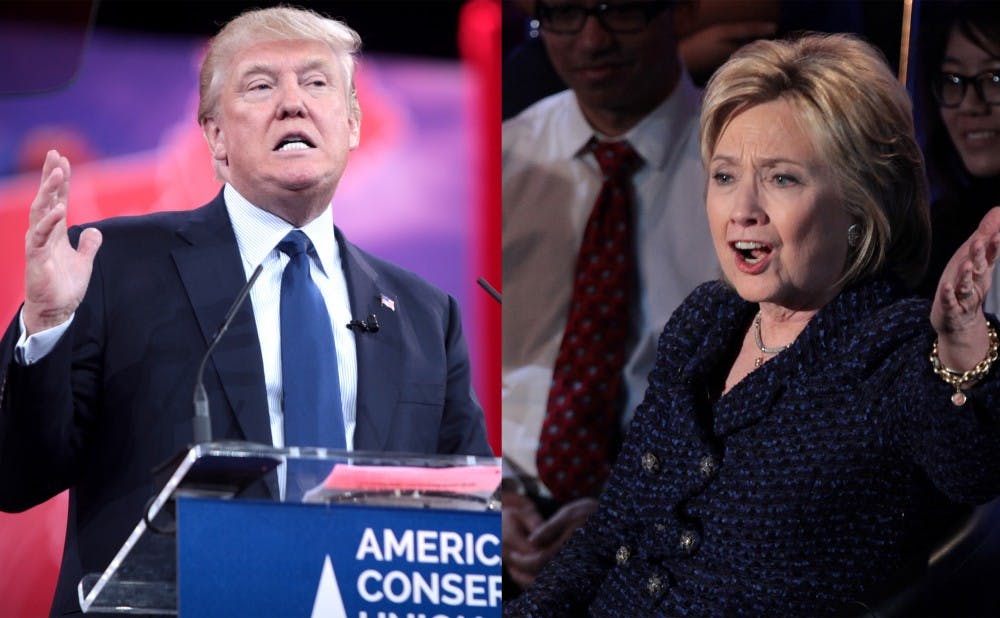While pundits are watching election results Tuesday, Duke administrators will be looking for who the new political players in charge of research funding will be.
Although Hillary Clinton’s and Donald Trump’s positions on issues such as immigration reform, gun laws and taxes have been carefully dissected by the media and public throughout past year, the candidates’ views on funding science and research have flown mostly under the radar. But the outcome of this year's presidential and congressional elections will determine the budget for the National Institutes of Health and could affect the funding Duke receives from the federal government in the immediate and long-term future.
In June, a subcommittee of the Senate Appropriations Committee approved an increase in the fiscal year 2017 budget for the NIH, marking the second year in a row the budget has seen a substantial increase after more than a decade of stagnant funding that resulted in a 22 percent loss of its purchasing power. This allocation was not approved, as Congress instead passed a short-term extension of funds at 2016 levels, which is set to expire Dec. 9.
As a top research university, Duke overall received 759 awards—amounting to a total of almost $398 million—in fiscal year 2016, up from approximately $363 million distributed among 740 awards in fiscal year 2015, according to the NIH website.
Chris Simmons, associate vice president of federal relations, noted that Clinton's voting record in the Senate and her work with major research universities in New York indicate that a Clinton administration would be supportive of scientific research funding.
"We don't know exactly what a Trump presidency would mean for Duke in the area of federal research for scientific agencies," Simmons added. "One of the things we don't know about Mr. Trump is he doesn't have a record of voting or promoting investment on scientific research, just because he hasn't held a position before."
Trump has spoken highly of NASA research before, Simmons noted, although the University gets more funding from the NIH and NSF.
“Ultimately the more money that goes into the pot, the better it is for Duke,” said Paul Vick, associate vice president for the Duke University Health System, adding that Duke scientists compete well for peer-reviewed research funding.
Vick also noted that neither Clinton nor Trump are against funneling money into scientific research, but that looking at research funding in the context of their overall agendas is more telling.
Clinton is focused on how investments affect the economy and the overall growth of the nation, Vick said. On the other hand, he added, Trump does not advise against funding scientific research, but he wants to put the resources of the government into building infrastructure and other issues.
"We clearly have a vested interest in having a Congress that is hospitable to science and a president who can make the case for science," said Misha Angrist, associate professor of the practice in the Social Science Research Institute and a senior fellow in Science & Society.
Both Angrist and Vick pointed out that the president has influence over how much the government invests in scientific research, but ultimately it is Congress that sets government agencies' budgets.
“The president has some latitude to promote science in various ways, but the lion’s share of the power lies with Congress,” Angrist said.
The outcome of the presidential race could indirectly affect the University, in that the president’s relationship with Congress would impact the NIH budget, he added.
However, there are other ways beyond just the NIH budget of introducing more money for government research funding, Angrist noted, citing President Barack Obama’s Precision Medicine Initiative and Vice President Joe Biden’s Cancer Moonshot initiative as examples of the executive branch’s ability to spearhead big “glamorous” projects.
“I think the more knowledgeable a president is about scientific research, the more interest they have in it and will acknowledge it,” Vick said.
Simmons also noted the importance of leaders having knowledge of science, and of the country's immigration policy influencing the University's ability to bring in scientists and researchers from other countries.
"One of the reasons our research and Duke is so successful is because we recruit around the world for the best scientists and scholars," he said. "I know that a lot of the immigration rhetoric in the campaign has been geared toward people coming across the border illegally. We would really hope the next president would do everything he or she can to make the United States more hospitable to the smartest people in the world."
Abigail Xie contributed reporting.
This article was updated Monday at 10 a.m. to include Chris Simmons' comments.
Get The Chronicle straight to your inbox
Signup for our weekly newsletter. Cancel at any time.

